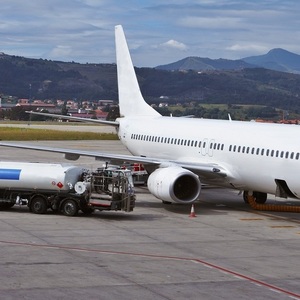Atlas Air partners with fuel supplier on SAF test flight

January 6, 2021
BY Atlas Air Worldwide Holdings Inc.
Atlas Air Worldwide Holdings Inc., a leading global provider of outsourced aircraft and aviation operating services, on Dec. 22 announced the completion of a transoceanic sustainable aviation fuel (SAF) test flight that originated at Spain’s Zaragoza Airport.
Atlas Air Flight 562 was powered by a blend of fuel containing 2.33 percent SAF sourced from fresh vegetable oil. The Boeing 747-400F left Zaragoza on Dec. 21 and arrived in Mexico City. This is believed to be the first transoceanic commercial cargo flight in Spain to include a blend of SAF and Jet A-1 fuel. Using life cycle analysis, SAF has been shown to reduce carbon emissions by up to 80 percent. The flight’s cargo included a shipment of goods from an Atlas customer.
Advertisement
“Innovative sustainable aviation fuel test projects demonstrate our ability to partner with our customers and suppliers to help create a more sustainable future for the air cargo industry and global commerce,” said John W. Dietrich, president and CEO of Atlas Air Worldwide. “Through ongoing meaningful partnerships, we will drive wider acceptance and availability of SAF, which will lower costs and have a positive impact on our industry and the environment.”
The blend of fuel was transported from Madrid to Zaragoza. Atlas Air partnered with Exolum, a subsidiary of CLH Group, and utilized its Avikor platform to implement the trial. Given the adaptable nature of SAF, no additional adjustments to fuel or engine components were necessary. The final blend was certified according to DEF STAND 91/091, with the SAF component certified for sustainability in accordance with International Sustainability & Carbon Certification (ISCC) guidelines.
“One of the main targets of Avikor is to promote universally a more sustainable way to fly, offering both individuals and enterprises the possibility of using sustainable aircraft fuel which reduces fuel emissions during flights and helps to improve our planet responsibly, without sacrificing the convenience of flying,” said Andrés Suarez, Global Strategy & Innovation Lead of Grupo CLH and CEO of Exolum.
Advertisement
In line with industry guidelines and best practices, Atlas is deeply committed to environmental stewardship through the reduction of aircraft emissions and resource consumption. Atlas has promoted sustainability by continuously driving operational efficiency and recognizes that the development of sustainable aviation fuels must be accelerated if the industry is going to meet its long-term environmental goals. Atlas is working with partners across the globe to ensure the safety and environmental benefits of SAF and to further its commercial viability.
Related Stories
The U.S. EPA on Aug. issued decisions on 175 small refinery exemption (SRE) petitions, granting full or partial exemptions of Renewable Fuel Standard blending obligations for 143 petitions. According to the EPA, 13 SRE petitions remain pending.
The U.S. EPA on Aug. 21 released data showing more than 1.92 billion RINs were generated under the Renewable Fuel Standard in July, down from 2.26 billion generated during the same month of last year.
STX Group, a leading environmental commodities trader and climate solutions firm, on Aug. 13 announced the completion of the first successful delivery of sustainable aviation fuel certificates (SAFc).
FutureFuel Corp. on Aug. 11 releases second quarter results, confirming that its 59 MMgy biodiesel plant in Batesville, Arkansas, remains idle due to market conditions. The company expressed hope the facility will restart in late 2025 or early 2026.
Tidewater Renewables on Aug. 14 announced its renewable diesel facility British Columbia operated at 72% capacity during Q2. The company continues to advance plans to add SAF capacity to facility, with a final investment decision targeted for 2026.
Upcoming Events










